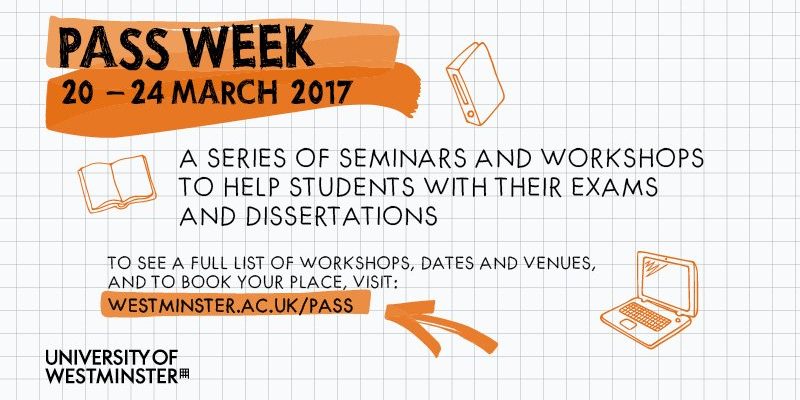After the University of Westminster held a brilliant PASS Week consisting of workshops to help with exams, we decided to speak to the organisers themselves to get the low down on what they covered. First up is Dr Nicola Allett, a Learning Adviser from Academic Learning Development…
Create a revision timetable
On your calendar mark when each exam will take place. Then identify time-slots you can dedicate to revision. Make sure you split you time between all of the exams and dedicate at least one revision slot per exam per week.
Decide on your timetable approach
Depending on the type of learner you are, you could take a fixed or a flexible approach to revision. A fixed timetable involves writing down a schedule for each day; identifying what you will do at specific times. A flexible timetable involves writing down tasks to be done and length of time, but the timing is left flexible (to decide on the day).
Know when and where you work best
Consider if you prefer studying in the morning, afternoon or evening. Also consider if you prefer working in a quiet study space. Working to your preference may make you more productive.

Know how you work best
Knowing your learning style will help you learn and memorise better. If you are not sure what your learning style is, you can complete a quiz that tells you here.
Identify revision material
Use good quality material, e.g. your own essays (55% and above); answers to seminar/tutorial questions and clear and comprehensive notes from lectures, seminars, and your own readings.
Decide which topics to cover and in what depth
Map the key topics and theories covered by your module. Look for connections and areas which overlap. Think strategically (e.g. a three question exam requires at least five areas of revision).
Know the difference between active and passive learning strategies.
Active strategies are where you actively do something with the material – they involve thinking and processing information. Try to make your revision more active!
| PASSIVE | ACTIVE |
| Re-reading your notes | Summarising your notes |
| Copying from a textbook | Creating diagrams and graphs |
| Copying out quotes | Making mind maps |
| Highlighting notes | Peer-to-peer testing |
| Typing-up notes | Answering past exam papers |
Take regular breaks
Don’t plan to study for more 2 hours at a time as you will become tired. Use short breaks to keep focus. You could try the ‘Pomodoro technique’: Use a timer for 25 minutes for focused study, then take 5 minute break. Repeat this up to 4 times and then have a longer break. Find out more here.
Make sure you know what the question words in essay titles mean
You will need to be able to understand the exam questions. View this study sheet, on Blackboard, for an overview and list of common phrases here.
Regularly reflect on your learning
Test yourself to check your learning – are your current revision strategies working? Also, assess how you are using your time. Make sure your revision timetable is realistic, you may need to revisit the timetable and make it more achievable.
Further materials about exam revision can be found on the ‘Skills Resources’ section on Blackboard. Log in to Blackboard, go to the tab ‘Learning Resources’ and click ‘Skills Resources’.
You can also seek advice from Academic Learning Development here.
Thank you to Dr Nicola Allett for writing this incredibly useful guide on exam advice. Nicola is a Learning Adviser from Academic Learning Development. She delivers one-to-one appointments and workshops on academic skills. If you would like to find out more click here.
- MA/MSc Marketing Management Students Enjoy A Residential Weekend At Beaumont Estate - March 19, 2018
- What It Takes To Work In The Charity Sector With University Of Westminster Alumni - March 6, 2018
- IBM University Business Challenge Bristol Semi Finals Get Underway, By Karen Kufuor - February 28, 2018
